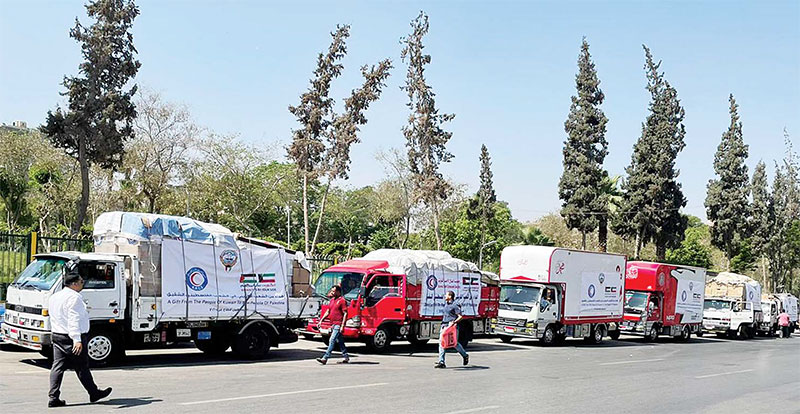26/05/2021
26/05/2021
GENEVA, May 26, (Agencies): Kuwait is keen to push forward the outputs of an upcoming United Nations Human Rights Council emergency session on the implications of the humanitarian and human rights situation in the occupied Palestinian territories, the ambassador said on Wednesday. The session aims to highlight the need to adopt a Human Rights Council draft resolution to establish an international investigation committee and activate accountability mechanisms for the Israeli occupation’s attacks on Gaza, Kuwait’s permanent United Nations and international organisations in Geneva representative Ambassador Jamal Al-Ghunaim said.

The remotely-held session, which comes to fruition after pressure by Kuwait and several Islamic countries, are being held in the wake of Israel’s violations of the Geneva Convention provisions, said the diplomat in a statement. Stemming from its commitment to defending the humanitarian and human rights conditions of the Palestinian people, Kuwait’s Foreign Minister and State Minister for Cabinet Affairs Sheikh Dr. Ahmed Nasser Al-Mohammad Al-Sabah will make an intervention during the session, the statement mentioned.
The intervention will give impetus to the work of this session and its outputs in support of the just Palestinian position, Ambassador Al-Ghunaim added. The move’s significance is also due to it being the first intervention of a Kuwaiti foreign minister at the Human Rights Council, since it was established in 2006. The session will also be an opportunity to review and document Israel’s violations, and to prevent further aggravating the humanitarian conditions of the Palestinian people. The emergency session will be the ninth held by the Human Rights Council to discuss Israel’s grave violations in the occupied Arab territories, including East Jerusalem.
US Secretary of State Antony Blinken jetted to Egypt on Wednesday as he pressed ahead with a diplomatic mission aimed at shoring up a cease-fire that ended an 11-day war between Israel and the Gaza Strip’s ruling Hamas militant group. Blinken landed in Cairo a day after holding intensive talks with Israeli and Palestinian leaders. In Egypt, he met with President Abdel Fattah el-Sissi and other top officials. Later he traveled to Jordan to meet with King Abdullah II. Blinken has vowed to “rally international support” to rebuild the destruction in hard-hit Gaza while promising to make sure that none of the aid reaches Hamas. He is instead trying to bolster Hamas’ rival, the internationally recognized Palestinian Authority. Blinken has set modest goals for the trip, his first official visit to the Middle East as secretary of state. His main goals have been to help rebuild Gaza and lower the tensions in contested Jerusalem that helped fuel the war. But he has made it made clear the US has no immediate plans to pursue peace talks between the sides and done little to address the underlying causes of the decades-long conflict, though he expressed hope for creating a “better environment” that might lead to negotiations.
In Cairo, Blinken on Wednesday met with el-Sissi for nearly two hours. Meeting with American diplomatic staff afterwards, he described Egypt as a “real and effective partner” that helped end the Gaza war and is helping “build something positive.” El-Sissi spoke to President Joe Biden last week before and after the ceasefire was announced. “I think we both believe strongly that Palestinians and Israelis deserve equally to, to live in safety and security to enjoy equal measures of freedom, opportunity and dignity. And we’re working on that together,” Blinken said before departing to Jordan. Both Egypt and Jordan are key US allies that have peace agreements with Israel and frequently serve as mediators between Israel and the Palestinians. Egypt maintains ties with Hamas, but also enforces a tight blockade on Gaza, along with Israel, with a shared goal of preventing the Islamic group from arming.
The stop in Cairo, along with Biden’s phone talks with el- Sissi, signal a closer relationship between the countries after a cooler beginning, when the US expressed concern over el-Sissi’s human rights record. The Gaza reconstruction effort will be an important test. The 11-day war killed more than 250 people, mostly Palestinians, and caused heavy destruction in the impoverished coastal territory. Preliminary estimates have put the damage in the hundreds of millions of dollars. Ahmed Aboul Gheit, secretary- general of the Arab League, said US commitment is critical for the region. Before the Gaza war, the Biden administration had kept its distance, preferring to focus on higher foreign policy priorities like China and Iran. “In the absence of an effective role for the US, we should expect nothing but more cycles of violence and bloodshed of innocent people,” he wrote in the Saudi daily Asharq Al-Awsat. One of the US goals is to ensure that any assistance be kept out of the hands of Hamas, which opposes Israel’s right to exist and which Israel and the US consider a terrorist group. In Gaza, Hamas leader Yehiyeh Sinwar told journalists Wednesday that the group welcomed international reconstruction aid, as long as it did not come from Israel, and had no objections to international oversight.


